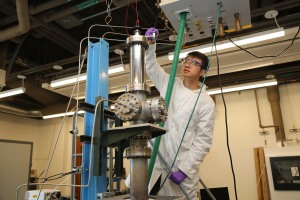Materials engineers design, create, and manufacture materials which include semiconductors, polymers, ceramics, metal alloys, and composites. Their contributions have led to breakthroughs in many fields including computing, communications, automobiles, energy, aerospace, buildings/infrastructure, and biomedical devices. The Materials Engineering curriculum at Brown provides graduates with both the expertise necessary to practice their profession as well as the interdisciplinary foundation necessary to collaborate with the engineers who will use the materials that they develop. A substantial fraction of Materials Engineering students at Brown participate in research which allows them to make use of Brown's state-of-the-art facilities in microscopy, materials characterization, materials processing, and fabrication.
The Program Educational Objectives PEOs of the Materials Engineering Sc.M. Program are to prepare the graduates: (1) To build on the knowledge gained in their undergraduate program in terms of strong engineering fundamentals, a specific strength in materials engineering, advanced written and verbal communication, and societal awareness and engagement, as well as new knowledge learned in their first years of employment or graduate school, to move toward positions of responsibility, leadership, and influence in the field; and (2) to be viewed as outstanding engineering leaders, whether in start-ups or multinational corporations or academia, in terms of technical competence and in their understanding of an engineer’s responsibility to society and to ethical behavior. Through this reputation they will be having a significant organizational influence in their work.
Students in the Materials master’s program can study a broad range of topics including:
- Biomaterials
- Ceramics
- Metals
- Polymers
- Composites
- Electronic materials
- Energy materials
- Thin films
Program of study
MASTER OF SCIENCE – NON-THESIS OPTION
Students take a total of eight courses to satisfy the degree requirements. Students are expected to complete the Master of Science – Non-Thesis program option in three semesters, taking three courses in the first and second semesters, and two courses in the third semester.
MASTER OF SCIENCE – THESIS OPTION
Students take a total of eight courses, including independent reading and research courses. Students are expected to complete the Master of Science – Thesis program option in four semesters, taking three courses in the first semester, two in the second and third semesters, and one in the fourth semester. Students can switch between degree options during the program for greater flexibility. Students interested in pursuing the Thesis option usually identify a faculty advisor during their first or second semester at Brown.
MASTER OF SCIENCE – PROFESSIONAL OPTION
In addition to the course requirements, a paid or unpaid experiential learning experience of 3-6 months is a required component of the professional track program. Experiential learning can include a summer internship or completion of ENGN 2960 (Experiential Learning in Industry (ELI)) as an elective course. Assistance in obtaining internships will be provided by the School of Engineering and Career Services and Professional Development in the School of Professional Studies.
